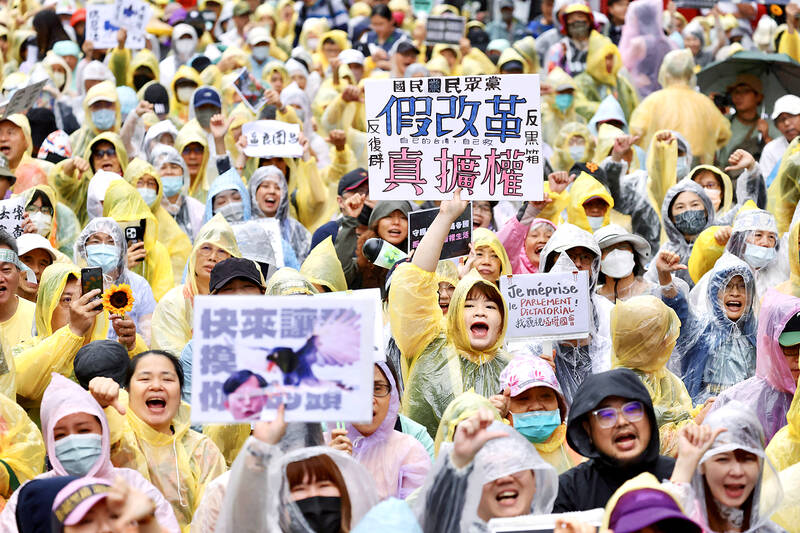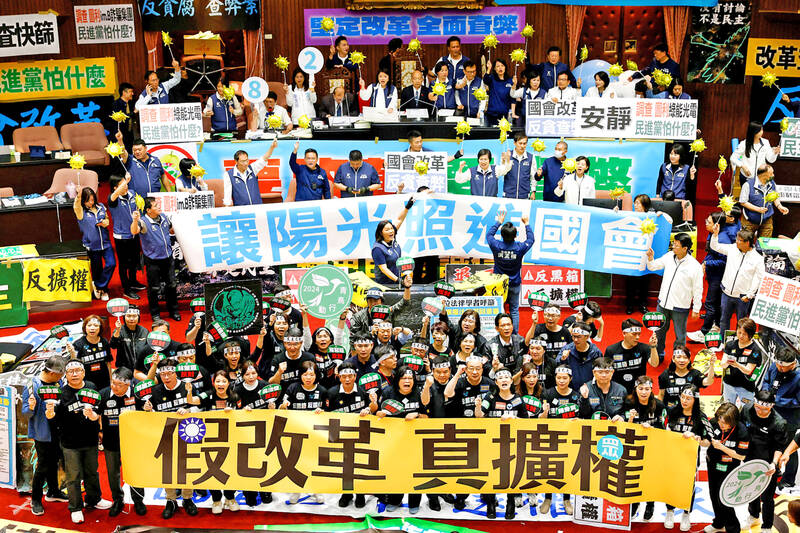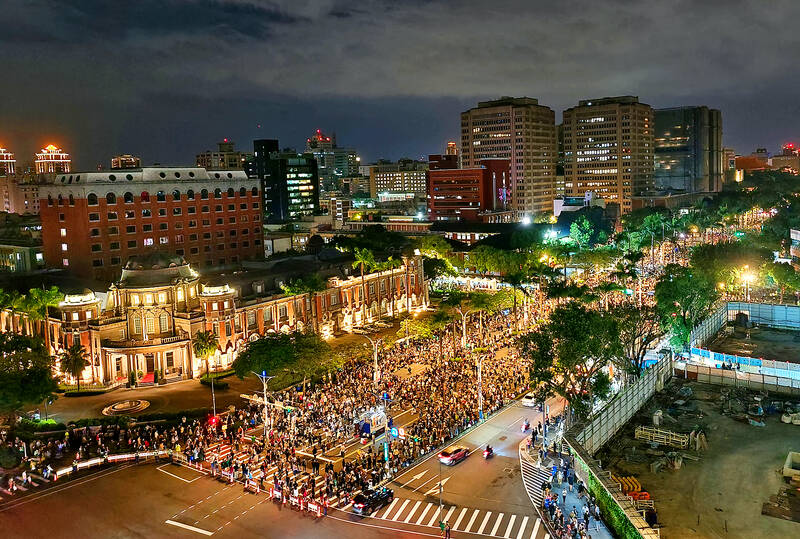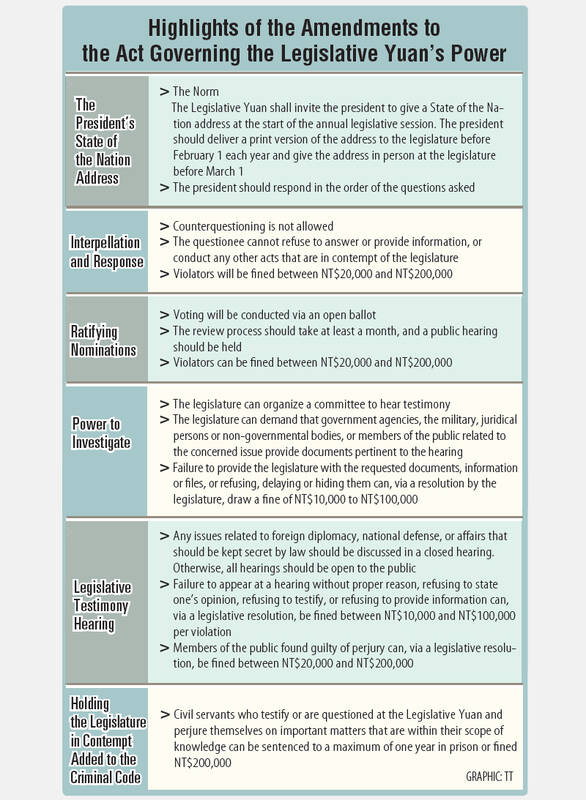The Legislative Yuan yesterday passed bills proposed by opposition lawmakers that would increase legislators’ oversight of the government as thousands of demonstrators gathered outside the venue to protest the changes.
The legislature passed the amendments to the Act Governing the Legislative Yuan’s Power (立法院職權行使法) after a day of raucous debates and scuffles between the governing Democratic Progressive Party (DPP), and the Chinese Nationalist Party (KMT) and the Taiwan People’s Party (TPP), which saw one lawmaker’s T-shirt ripped.
Progress on passing revisions to the act had been slow earlier in the day, as the DPP made legislators go through all 77 articles of the act — even those not being changed — as a stalling tactic.

Photo: Ritchie B. Tongo, EPA-EFE
The floor of the legislature was as colorful and boisterous as the streets outside, with representatives from both sides festooning the Legislative Yuan with placards.
DPP lawmakers had waved bubble tea-shaped torches, shouting: “Brush your teeth, your breath stinks” at their KMT colleagues, a reference to what they said are opposition lies about the bill.
“End the meeting if there is no discussion,” they said.

Photo: Carlos Garcia Rawlins, Reuters
Opposition lawmakers, holding sun-shaped balloons, shouted: “Let sunlight into the legislature.”
As the disagreement turned physical, KMT lawmakers yelled: “The DPP is a violent party.”
In the end, the amendments were passed on their final reading through a show of hands, with opposition lawmakers voting in favor of the changes.

Photo: Wang Yi-sung, Taipei Times
The KMT holds 52 seats in the 113-seat legislature, while the TPP has eight and the DPP has 51. Two independent legislators are ideologically aligned with the KMT.
The reforms give legislators the power to ask the military, private companies or individuals to disclose information deemed relevant by lawmakers, and compel the president to give a “state of the nation” address at the start of the annual legislative session, at which they must answer lawmakers’ questions, which would be a first in Taiwan.
They also criminalize contempt of the legislature by government officials, and made changes to the Criminal Code that would impose a fine of up to NT$200,000 and jail time of up to one year for public officials who lie during a legislative hearing.

There are concerns those powers could lead to leaks of sensitive information and punishments for those who refuse to answer questions.
The Control Yuan, the supervisory branch of the government, already has the power to investigate and impeach officials. It said in a statement yesterday that it could not accept the law passed by the legislature as it violates the division of power.
The KMT has denounced the DPP for trying to “paint them red,” the color of the Chinese Communist Party, and said that the ruling party is trying to stymie efforts to investigate corruption cases and sow unfounded fears about the reforms.
The crowds outside the legislature yesterday followed demonstrations last week that were among the largest since the 2014 Sunflower movement, when protesters stormed and occupied the legislature to block the passage of an unpopular trade pact with China.
With the help of social media, protests yesterday were quickly arranged in at least 10 cities.
Protesters have dubbed their movement the “Blue Bird Action” — named after the road next to the Legislative Yuan in Taipei where they gathered.
“Even if democracy is dead, we will not stop fighting,” shouted protesters dressed in raincoats and holding umbrellas in the rain.
They also shouted: “Refuse Chinese political interference,” among other slogans.
“Your efforts will not go to waste,” Lai Chung-chiang (賴中強), convener of the Economic Democracy Union — an organizer of the demonstrations — told protesters after the measures were passed.
The Cabinet should send the bills back for another legislative review, he added.
The DPP has pledged to seek a constitutional review.
“There will be two violations of the Constitution,” DPP caucus whip Ker Chien-ming (柯建銘) said on Monday, adding that they were procedural and substantive contraventions.
In a statement released late last night, the Executive Yuan said it will return the bills to the legislature for reconsideration.

ACTION PLAN: Taiwan would expand procurement from the US and encourage more companies to invest in the US to deepen bilateral cooperation, Lai said The government would not impose reciprocal tariffs in retaliation against US levies, President William Lai (賴清德) said yesterday, as he announced five strategies to address the issue, including pledging to increase Taiwanese companies’ investments in the US. Lai has in the past few days met with administrative and national security officials, as well as representatives from various industries, to explore countermeasures after US President Donald Trump on Wednesday last week announced a 32 percent duty on Taiwanese imports. In a video released yesterday evening, Lai said that Taiwan would not retaliate against the US with higher tariffs and Taiwanese companies’ commitments to

‘SPECIAL CHANNEL’: Taipei’s most important tasks are to stabilize industries affected by Trump’s trade tariffs and keep negotiations with Washington open, a source said National Security Council Secretary-General Joseph Wu (吳釗燮) arrived in the US for talks with US President Donald Trump’s administration, a source familiar with the matter said on Friday. Wu was leading a delegation for a meeting known as the “special channel,” the Financial Times reported earlier. It marked Trump’s first use of the channel since returning to the White House on Jan. 20. Citing a source familiar with the matter, the Financial Times reported that Minister of Foreign Affairs Lin Chia-lung (林佳龍) was also a part of the delegation. The visit came days after China concluded war games around Taiwan and amid Trump’s

CHIP EXCEPTION: An official said that an exception for Taiwanese semiconductors would have a limited effect, as most are packaged in third nations before being sold The Executive Yuan yesterday decried US President Donald Trump’s 32 percent tariff on Taiwanese goods announced hours earlier as “unfair,” saying it would lodge a representation with Washington. The Cabinet in a statement described the pledged US tariffs, expected to take effect on Wednesday next week, as “deeply unreasonable” and “highly regrettable.” Cabinet spokeswoman Michelle Lee (李慧芝) said that the government would “lodge a solemn representation” with the US Trade Representative and continue negotiating with Washington to “ensure the interests of our nation and industries.” Trump at a news conference in Washington on Wednesday announced a 10 percent baseline tariff on most goods

Intelligence agents have recorded 510,000 instances of “controversial information” being spread online by the Chinese Communist Party (CCP) so far this year, the National Security Bureau (NSB) said in a report yesterday, as it warned of artificial intelligence (AI) being employed to generate destabilizing misinformation. The bureau submitted a written report to the Legislative Yuan in preparation for National Security Bureau Director-General Tsai Ming-yen’s (蔡明彥) appearance before the Foreign Affairs and National Defense Committee today. The CCP has been using cognitive warfare to divide Taiwanese society by commenting on controversial issues such as Taiwan Semiconductor Manufacturing Co’s (TSMC, 台積電) investments in the